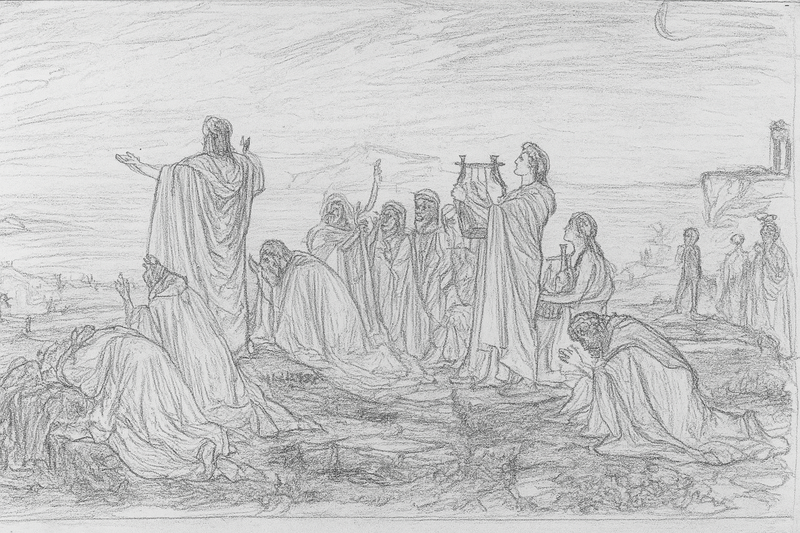
Pythagoras was the "father" of us all - bota.al


In the beginning there was Pythagoras. He was the first to call himself a philosopher. He was the first to defend the immortality of the soul and reincarnation. He was the first to discover the secret laws of mathematics and musical harmony. He was the first scholar to deal with politics and constitutions, with medicine and with the stars. He was the first among the Italics, the founder of Magnae Graeciae, a colony larger than mother Greece itself. And he was the first to establish an Italic school.
After him came the Eleatic school of Parmenides in western Italy, Empedocles in Sicily, and others. Pythagoras founded wisdom at the intersection between theology and thought, between myth and science, between cult and music, politics and education, medicine and astronomy; and he considered the center of wisdom precisely in the organic connection between knowledge, practices, rites and mysteries.
Say Pythagoras and people think of the theorem that bears his name or most often the Pythagorean table. Or if you mention the esoteric wisdom of Pythagoras, one thinks of Freemasonry and its secret architecture from which Pythagoras drew inspiration.
But Pythagoras, devoted to Apollo, student of Orpheus, teacher of Plato and of many philosophers and mathematicians, was more than that, he was considered almost a god, a bridge between the human and the divine; some evidence shows that Pythagoras had a thigh of gold, as proof of his supernatural origin. He himself said of himself that he was born of seeds more powerful than human ones. But for him, only truth makes one similar to the gods.
Pythagoras was born around 572 BC in Samos, Greece, but his family was of Etruscan and Tyrrhenian origin; his father Mnesarchus was a jeweler, a sacred art. Pythagoras was initiated into the Mysteries by Egyptians, Chaldeans, Jews, and Magi. But his life flourished in southern Italy, especially in Crotone and Metapontum.
Porphyry relates that in a single lecture delivered “immediately after landing in Italy,” Pythagoras gathered around him over 2,000 people who, after listening to him, decided never to return to their homes and built a large house of listeners, founding what everyone called the Magna Graecia of Italy.
Nuk është rastësi që Ernst Bloch thoshte: “Italia është vendi ku gjithçka fillon”. Pitagora është shembulli më i ndritshëm i asaj urtësie antike greke dhe italike për të cilën shkroi Vico. Në atë shkollë, Pitagora mësonte doktrinën mistike, vendoste ligje për italikët, krijonte një komunitet; qytetet çliroheshin, përshkoheshin nga urtësia e tij, nga Sicilia në Taranto. Në shkollën e tij sundonte një dietë vegjetariane, disiplina e jetës, heshtja, veçanërisht për fillestarët, përçmimi i famës dhe pasurisë; të mirat ishin të përbashkëta, por kushdo që tregonte se nuk ishte i denjë për t’i përkitur (shkollës) përjashtohej si i huaj i një race tjetër dhe merrte dyfishin e të mirave që kishte vënë në bashkësi. Një lloj shpërblimi ngushëllues dhe largim me nder për ata që nuk ndiqnin udhën e përjetësisë. Në fillim dhe në fund të çdo dite duhej bërë bilanci: çfarë ke bërë, ku gabove, cilin detyrim nuk e përmbushe.
Pitagora hapi shkollën edhe për fëmijët dhe gratë – e famshme ishte dishepullja e tij Teano – e cila këshillonte që të mos keqtrajtoheshin gratë. Në shkollën e tij trajtoheshin sëmundjet e trupit, injoranca e shpirtit, shthurja e barkut, mosdëgjueshmëria publike, përçarja e njerëzve, mungesa e masës. Praktikohej respekti ndaj natyrës, ndaj bimëve dhe kafshëve; ndalohej ngrënia e mishit, pirja në bankete dhe flijimet. Mësohej miqësia mes njerëzve dhe me kozmosin, përfshirë qëndrimin dhe stilin.
Dishepujt ndaheshin në pitagorikë dhe pitagorikas, domethënë matematikanë ose akuzmatikë, ezoterikë ose eksoterikë. Më pas shkolla nxiti zili dhe hakmarrje, aq sa ndjekësit e Cilones (një lloj pararendës i mafies së sotme?) vendosën shkatërrimin e shkollës dhe masakrimin e ithtarëve të saj. Pitagora u strehua në Metapont, ku edhe vdiq. Shtëpia e tij u kthye në një tempull kushtuar Demetrës (një bazilikë neopitagorike u zbulua në vitin 1917 në Romë, te Porta Maggiore).
Pitagora nuk la shkrime – përveç një përmbledhjeje poetike të njohur si “Vargjet e artë”, të redaktuara nga Julius Evola – por la një gjurmë shumë më të thellë, të dukshme dhe të padukshme. I shenjtë ishte për të tetraktis, trekëndëshi magjik i ndërtuar mbi bazën e katër numrave të parë: një, dy, tre, katër, të cilët jepnin shumën dhjetë: shuma e të gjitha gjërave, e të gjithë numrave dhe e gjithë botës.
Pitagora vishej me ngjyra të hapura, me rroba të bardha dhe të pastra, shmangte përdorimin e lëkurëve të kafshëve dhe përdorte çarçafë linoje. Ofronte jo vetëm temjan dhe mirrë, por edhe kulaçë, meli, bathë (për të, të shenjta). Ndër mrekullitë e tij legjendare, thuhet se ai kishte aftësinë të ishte në dy vende njëkohësisht (bilokacion), të zbriste në botën e nëndheshme, njihte jetët e tij të mëparshme dhe të ardhshme; zbuti ariun e egër daunian, foli me demin e Tarantos, përkëdheli shqiponjën e bardhë në fluturim.
He used music, songs and dance as therapy, as “magic” and catharsis, between the Dionysian flute and the Apollonian lyre. For Pythagoras, the Beginning is half of everything: it seems like the proverb “the beginning is half the work”, but he understood the beginning as a complete initial preparation, encompassing life and all of humanity.
For Empedocles, he was "a man of supernatural knowledge who gained divine knowledge thanks to rare experiences, excellent in every knowledge of every kind." / bota.al

The Ukraine summit that ignored the tough questions
ideas
top
Alfa recipes
TRENDING 
services
- POLICE129
- STREET POLICE126
- AMBULANCE112
- FIREFIGHTER128



























